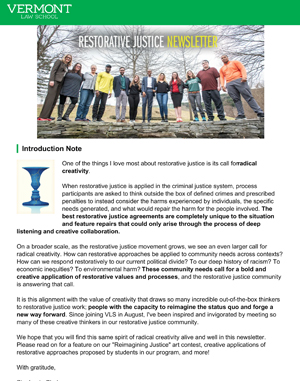The Vermont Supreme Court will hear oral arguments in six cases during the high court’s annual session at Vermont Law School on Monday, March 17, in Oakes Hall on the VLS campus. The session is open to the public. Vermont Court Rules apply for media coverage.
The court will consider the following cases:
In re Appeal of Application of Seneca Mountain Wind, LLC, 2013-372 9:30 to 10 a.m.: Towns of Newark and Brighton and other concerned citizens appeal the Vermont Public Service Board’s decision to approve Seneca Mountain Wind’s application to install four temporary meteorological towers in Brighton, Ferdinand, and Newark, Vermont. If built, one of the towers will be located 700 feet from a sheer rock cliff known as Hawk Rock where peregrine falcons are known to nest. Appellants argue that the Board erred by excluding evidence concerning aesthetics. They also challenge the Board’s conclusions that the towers will not have an undue adverse effect on aesthetics or the natural environment, imperil necessary wildlife habitat or endangered species, or unduly interfere with the region’s development. Appellants further argue that some adjoining landowners were denied the opportunity to intervene, and that the Brighton towers cannot be considered “temporary” because towers have been erected and removed from those sites repeatedly for the past ten years.
In re Howard Center Renovation Permit, 2013-463 10 to 10:30 a.m.: South Burlington School District appeals from the Environmental Division’s decision affirming the issuance of a zoning permit to Howard Center, Inc. for interior renovations required to open a methadone clinic at 364 Dorset Street in South Burlington. The new methadone clinic will serve approximately 800 to 1000 patients and is within 500 feet of the middle school and 1000 feet of the high school. The School District argues that the Environmental Division erred in concluding that a traffic study was not required before a permit could be issued, that the methadone clinic is not a change in use (the building is currently permitted as a medical office) so a site plan review is not required, and that safety is not a permissible consideration for review.
Martin v. Christman, 2013-250 11 to 11:30 a.m.: Parents of a three-year-old girl who was bitten in the face by a dog owned by friendly acquaintances at a campground in Island Pond argue that Vermont should abandon the common law approach and adopt strict liability for dog bites. Parents brought negligence and strict liability claims against the dog’s owners and their homeowners’ insurance company. The superior court, stating that it was adhering to Vermont Supreme Court precedent, granted the owners’ motion to dismiss the strict liability claim. The parties agreed to dismiss the negligence claim so that the strict liability issue could be appealed. Parents argue on appeal that the Supreme Court has the authority and the ability to change common law when the old rule no longer serves societal interests and that a change is needed here. Owners argue that such a change is instead the prerogative of the Legislature.
Nelson v. Town of St. Johnsbury, 2013-386 1:30 to 2 p.m.: The former town manager of St. Johnsbury appeals from the trial court’s determination that the town selectboard properly fired him. He argues (1) that the selectboard needed just cause to fire him under the relevant statute; (2) that he has a private right of action to sue the selectboard for allegedly violating his due process rights under the Vermont Constitution; and (3) that he was entitled to rely on the town attorney’s alleged representations to him that he could only be fired for cause. The Town of St. Johnsbury and its selectboard counter (1) that the town manager’s appointment is at the will of the selectboard by statute; (2) because his appointment is at will, he has no due process claim or, in the alternative, the selectboard had just cause to fire him; (3) that he has not made out a case of promissory estoppel; and (4) that the selectboard members are in any event protected by qualified immunity.
State v. Grenier, 2013-224; State v. Harris, 2013-300 2 to 2:30 p.m.: Defendants in these consolidated cases were charged with driving under the influence after breath-alcohol tests conducted on Datamaster DMT devices indicated that their blood-alcohol level was over the legal limit. Defendants moved to exclude the breath-alcohol test results on the basis that a Vermont Department of Health rule requires the commissioner to approve any instrumentation and procedures used for analyzing breath-alcohol content for evidentiary purposes, and the Datamaster device had not been approved. The trial court denied the motion. On appeal, defendants claim that the trial court abused its discretion by refusing to hold a hearing on their motions to exclude, thereby violating their due process rights, and erred by failing to exclude the Datamaster results.
In re Musto Wastewater System & Water Supply Permit, 2013-366/367 2:30 to 3 p.m.: This case centers around an approved septic system permit for a camp building on the western shore of Lake Bomoseen in Castleton, Vermont. The site currently contains a small, one-story seasonal camp building, which permit applicants wish to reconstruct into a year-round residence. Appellant is a neighbor, who alleges that the septic system will adversely affect her property’s value, pollute the lake, and that noise and odor from the system will affect her use and enjoyment of her adjoining property. Issues on appeal include standing and the timeliness of neighbor’s appeal, and whether the trial court erred in finding the current camp building contains three bedrooms and not two.


















